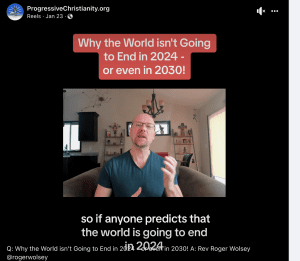It isn’t 2024; Jesus wasn’t born in 1 A.D.; and the world won’t end in 2024.- or any time soon.
A.D. comes from the Latin “Anno Domini” means “the year of our Lord” so when we say 2024 whether we know it or not, we’re employing the Christian calendar and we’re saying “the Year of Our Lord 2028 or 2030 A.D. (CE).” B.C. comes from the English “Before Christ.”
Wait a minute Roger, did you say that “Jesus wasn’t born in the year 1 A.D.”? If B.C. means before Christ, doesn’t that mean that Jesus was born in 1 A.D.?
Yeah, that’d make sense — if it weren’t for the mistake.
Here’s a video version: 
In 525 a monk employed by Pope John I committed an epic (pun intended) fail. In 1582, when the Western world switched from the Julian calendar to the Gregorian one that we now use, Pope Gregory’s handlers utilized that monk’s dating for when Jesus was thought to have been born was inadvertently altered by 4-6 years. That monk, Dionysius Exiguus (the inventor of Annos Domini), forgot to factor in that Jesus was born under the reign of King Herod and Herod is known to have died in what we mistakenly refer to as 4.B.C. If Jesus were born later than 5 B.C., he would have been too young to fit the Gospel of Luke’s report that he began his ministry at about 30 years of age. Since there is no year zero, that means that the third millennium after the birth of Christ probably started in November or December 1997 – meaning what we call 2001 happened already in what we now call 1997.[1] We need to add 4 –6 years to whatever year it happens to be, i.e. if you are reading this blog in 2024, you’re actually reading it in 2028-2030!
And THAT means any prophecies about “the end of the world supposed to take place in 2024, 2025,” etc. Are bogus.
There’s a lot that can be said when it comes to discussing these matters. Theological issues such as “eschatology,” “apocalypse,” “post-tribulation,” “millennialism,” “the rapture,” and the like tend to be part of the landscape of this territory. I speak to those topics in my book Kissing Fish: christianity for people who don’t like christianity. And you can read the full chapter where I discuss those matters at this blog: “The End Isn’t Nigh!” But frankly, that stuff isn’t essential to the Christian faith as I understand it. So I’d like to close with the concluding words of the 10th chapter of Kissing Fish:
……Many progressive Christians believe it when we say, “Christ has died, Christ is risen, Christ will come again.”[1] Yet, rather than spending our time and energy waiting and planning for Christ’s return, we think the world would be better served by reducing his level of disappointment when he does. Many of us share the view expressed in this assertion: “I am not as concerned about when the moment will be as I am about the fact that the moment is coming. I want to encourage you to get off the ‘Planning’ Committee and get on the ‘Welcoming’ Committee.”[2] We’d rather see ourselves as being on the street team (like promoting an upcoming band gig or theater show). Instead of informing folks about Jesus with lots of information, we seek to simply be Jesus. We seek to be part of the incarnate, living Body of Christ — helping people experience his love and his Kingdom here and now.
Progressive Christians also resonate with the late Catholic Henri Nouwen when he said, “Where will you find the Messiah? — He is sitting among the poor covered with wounds…” as well as Emergent Christian pastor Brian McClaren’s observation that “The Gospel is a transformation plan, not an evacuation plan.”
We agree that our hope is in the future, but let’s embrace and be present to the present moment.[3]
It’s hard to embrace the present without a sense of hope for the future. As Christians, we believe that God is actively seeking to move Creation toward a beautiful goal. Like Paul, we have “our eyes on the prize”[4] and we “press on toward the goal to win the prize for which God has called us.”[5] We sense deep in our bones that things will turn out okay — in fact, far better than we could ever imagine.
“I truly believe that in the big picture good will win out over bad. As Theodore Parker first put it (later restated by Martin Luther King Jr) “I do not pretend to understand the moral universe; the arc is a long one, my eye reaches but little ways; I cannot calculate the curve and complete the figure by the experience of site; I can divine it by conscience. And from what I see I am sure it bends towards justice.”
Progressive Christians have hope in the conviction that somehow despite all sorts of evidence to the contrary, love wins.
XX ~ Roger
 Rev. Roger Wolsey is a certified Spiritual Director, United Methodist pastor, and serves on the Board of Directors of ProgressiveChristianity.Org. He is a contributing writer for the Progressing Spirit newsletter, and author of Kissing Fish: christianity for people who don’t like christianity His new book, Discovering Fire: Spiritual Practices That Transform Lives, is available on Amazon.
Rev. Roger Wolsey is a certified Spiritual Director, United Methodist pastor, and serves on the Board of Directors of ProgressiveChristianity.Org. He is a contributing writer for the Progressing Spirit newsletter, and author of Kissing Fish: christianity for people who don’t like christianity His new book, Discovering Fire: Spiritual Practices That Transform Lives, is available on Amazon.
[1] See this article by David Briggs of the AP about Paul Maier, “Bible Scholar from WMU says the 2,000th anniversary of Christ’s birth likely was last year,” Sat. Jan. 11, 1997, The Grand Rapids Press
[1] A common litany that is part of the liturgy in mainline Protestant denominations.
[2] James McDonald, http://blog.harvestbiblefellowship.org/?p=3699
[3] I’m reminded of the song Right here, Right now by the British alternative rock band Jesus Jones. See:http://www.lyricsmode.com/lyrics/j/jesus_jones/right_here_right_now.html & http://www.youtube.com/watch?v=7z6dxQVhE8o
[4] Based on 1 Corinthians 9:24 and the Civil Rights era folk song, Keep Your Eyes on the Prize. See also my description of this at http://wiki.answers.com/Q/What_is_All_eyes_on_the_prize_definition
[5] Philippians 3:14
[6] https://shorturl.at/bjqs0 Nov. 3, 2020












